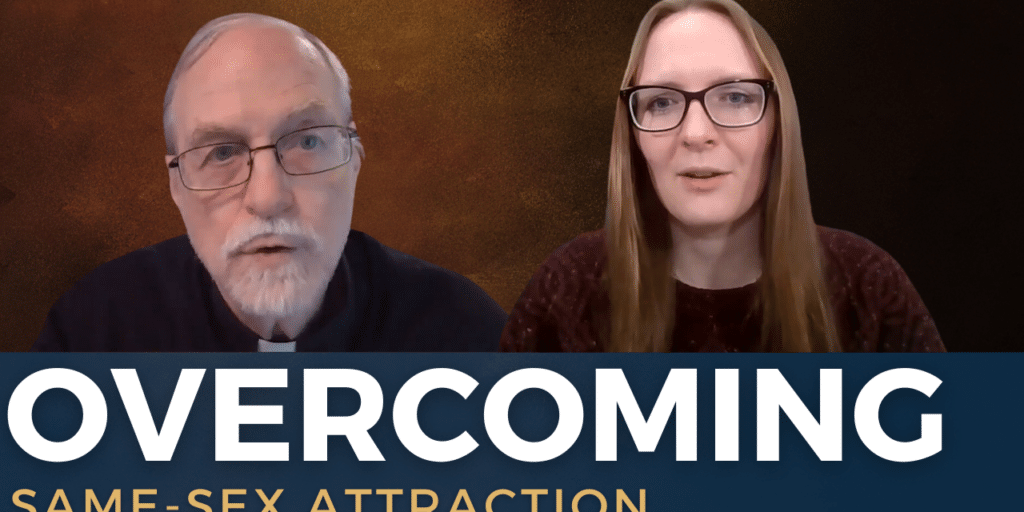Marriage vs. Porn: Battle for the Soul of our Culture
“…[a]t a moment in history in which the family is the object of numerous forces that seek to destroy it, or in some way to deform it, and aware that the well-being of society and her good are intimately tied to the good of the family, the Church perceives in a more urgent and compelling way her mission of proclaiming to all people the plan of God for marriage and the family, insuring their full vitality and human and Christian development, and thus, contributing to the renewal of society and the people of God.”
― Pope St. John Paul II, Familiaris consortio, no. 3
Long before Christ ever came to earth and preached the Gospel, human beings understood that forming a life-long relationship with another person and starting a family was one of the most important, meaningful, and desirable things any person could do.
Although the degree to which various societies protected marriage varied, even many of the most decadent societies, such as Rome, understood that the family unit composed of a mother, father, and children, was an essential part of a functioning civilization, and must be privileged.
When Christ came, however, he elevated the institution of marriage to an even higher plane, instituting it as a sacrament. In the writings of St. Paul, the union of a man and a woman in marriage became a symbol for something as lofty as the relationship between Christ and His Church.

And yet, despite the innumerable unquestionable goods that come from marriage, both for the individual and for society, we find ourselves right now in the midst of a crisis of marriage. As a recent study by Pew Research found, extraordinarily few young Americans are bothering ever to get married.
According to the study, in 2021 a full 25% of Americans who had reached the age of 40 had never been married. This marks a significant increase from just ten years earlier, when just 20% of 40-year-olds had never married.
However, the magnitude of the cultural shift becomes startlingly clear when you compare the 2021 marriage rates to those of 1980. In that year, only 6% of 40-year-olds had never been married. In other words, the rate of unmarried 40-year-olds has increased by nearly twenty percent in the past three decades. Whereas in the past, it was simply expected that, barring unusual circumstances, you would be married by the age of 40, it is now becoming normal for young Americans never to marry.
As Pew Research points out, just because someone isn’t married by the age of 40 doesn’t mean that they won’t ever get married. In recent decades there has been a steady movement towards later and later marriages. However, even if one takes into account delayed marriages, it is clear that many Americans aren’t getting married. And many of them seem to have no intent ever to do so.
Furthermore, the age 40 is a watershed moment, since for many women fertility drops steeply after that age. If they are not married by that time, their chances of conceiving naturally are extremely low. Given that married women are far more likely to have children than unmarried or divorced women, it’s likely that a large part of America’s plunging birthrate is due to plunging marriage rates. In fact, that’s precisely what the Institute for Family Studies argues here.
Why Are People Not Getting Married?
The natural question to ask in the face of this huge drop in marriage is why is it happening? Unfortunately, it’s not easy to find reliable answers. As with other complex phenomena, such as the decline in birth rates, it’s likely that there are a host of complex, interrelated reasons.
One reason, no doubt, is the huge increase in cohabitation as a standard way of life. Many Americans, rather than getting married, will instead enter a series of semi-long-term relationships. Some of those may be so stable that they are essentially equivalent to marriage. However, as Pew Research points out, the increase in cohabitation rates doesn’t come close to explaining the phenomenon, since only 22% of never-marrieds were cohabiting in 2021.
While this might seem somewhat speculative, my own suspicion is that the giant elephant in the living room (or at least one of them) is the rise in Internet pornography. On this, I am inclined to at least partly agree with Michael Warren Davis, who argued in a somewhat depressing recent article that porn “explains everything.”
More specifically, he argues that widespread porn usage is likely the secret source of our culture’s rapidly-shifting cultural standards on matters of sex and gender. Because so many people are hooked on porn, and because so much pornography depicts transgressive sexuality, including homosexuality, BDSM and transgenderism, many people have naturally developed a high degree of “tolerance” towards these sexual behaviors, which they are spending so many hours of their lives fantasizing about.
While Davis does not address the decrease in marriage rates, it doesn’t take much to extend his argument. While widespread access to high-definition, streaming pornography may not “explain everything” about dropping marriage rates, I suspect it explains a lot.
Sociologists will sometimes speak about the “sexual marketplace.” While the terminology is somewhat crude and reductive, it does get at something very real about human society: i.e., that human beings do compete in a kind of marketplace for the right to enter into sexual relationships, in part in order to fulfill their natural sexual appetites.
Traditionally, this “marketplace” has centered on the institution of marriage, with “successful” participants in this marketplace entering into exclusive, life-long, stable marriages, in which their sexual appetites are ultimately fulfilled in a healthy way that calls them to higher ideals, and ensures the long-term health and stability of society.
While from the Catholic standpoint, getting married is about way more than sex, it is also true that one of the attractions of marriage is the possibility of fulfilling one’s sexual desires in a stable way. And it is undoubtedly true that the desire for a sexual relationship is a powerful motivating factor, leading young men and women to actively pursue relationships that might in time result in marriage.
All of this is part of God’s great plan for human beings, and for how to ensure the flourishing of the human species. In healthy societies, the direction of our natural sexual appetites in productive ways takes forms that are rich with meaning. Think only of all the many beautiful rituals that traditionally fostered and surrounded courtship: all the various parties and dinners and dances; the shy proposals; the bemused chaperones, etc.
In addition, all healthy societies have implemented various more-or-less strict methods of incentivizing citizens to restrict sexual activity to marriage. This can include formal legislation that prohibits or limits divorce, or that rewards marriage with various tax breaks, etc. However, at least as powerful are the various taboos, in which all of the cultural messages that young people receive, whether from friends or family or the entertainment industry, reinforce the idea that such things as fornication are shameful and unacceptable.
In the West, however, these taboos and legislation started breaking down in the early 20th century, as laws prohibiting divorce were loosened and as depictions of overt sexuality became more common in entertainment. That process was super-charged in the 1960s with the sexual revolution, in which a near total reversal of sexual values was preached from the housetops. In the context of the sexual revolution, such things as fornication and divorce became positive values, to be praised as brave and beautiful.
The result of this reversal of values was a reduction in the “value” of sex. In the hook-up culture that emerged after the 60s, one no longer needed to put in any level of hard work to “win” in the sexual marketplace. All one had to do was go to a bar and buy someone a few drinks. If one wanted to avoid even that amount of trouble, it was possible to “co-habitate” — entering a long-term sexual relationship, but without having to make any level of permanent commitment and to engage in the kind of hard work that maintaining a permanent relationship requires.
Enter pornography.
One need not look very far to find examples of young men who have decided that all the effort involved in pursuing an actual woman for a long-term relationship is simply “too much trouble.” It is far easier to live in their bedroom, pursuing an endlessly novel stream of hyper-stimulating sexual partners and behaviors.
And thus, the values of the sexual revolution reach their natural culmination: with young people utterly isolated from one another, and sex reduced to an unapologetic pursuit of selfish and utterly meaningless pleasure.
Man’s Vocation Is to Love
There are all sorts of unintended consequences to a sexual marketplace in which sex becomes a cheapened, readily available “commodity.” We’ve spoken about these often in previous columns. These include such things as a rapid rise in sexually transmitted diseases, acceptance of contraceptive mentality, unintended pregnancy, abortion, the widespread manipulation and abuse of women (who typically bear the overwhelming brunt of “cheap” sex), the breakdown of healthy relationships between the sexes, and, yes, a significant reduction in marriage rates.
However, there is another, arguably much deeper and simpler way of considering how the preponderance of pornography, as well as the widespread acceptance of hook-up culture and co-habitation, are driving down marriage rates.
Advocates of pornography like to argue that watching pornography is “just” watching pornography. In other words: don’t overthink it. It’s just a form of “harmless” entertainment that doesn’t have any particularly meaning for either good or ill. This, obviously, is profoundly naïve. In fact, it’s outright idiotic.
The fact is nothing we do is “just” meaningless. Every choice we make has some more or less significant impact on our lives. The images and entertainment that we use to fill our imaginations shape the way we interact with the world.
In Familiaris consortio, Pope St. John Paul II notes that man has an incredibly lofty vocation: i.e., to love. As he writes:
God is love and in Himself He lives a mystery of personal loving communion. Creating the human race in His own image and continually keeping it in being, God inscribed in the humanity of man and woman the vocation, and thus the capacity and responsibility, of love and communion. Love is therefore the fundamental and innate vocation of every human being (no. 11).
It is true that this vocation to love can be expressed in myriad ways. For Catholics, in particular, there are the beautiful options of the consecrated life or priesthood, in which a person forgoes expressing their sexuality, in order to enter more deeply into communion with other human beings, and ultimately with God.
However, the normative way for most human beings to live this vocation of love is to enter into union with a person of the opposite sex in marriage. In marriage, a person learns to transcend their own desires, and to put the good of their spouse before their own, vowing to love their spouse with a love that is so steady, self-sacrificial, and self-giving, that no life’s circumstances can interrupt or harm it: in other words, a love that is an emblem of God’s ceaseless, self-giving love for us.
However, flood a society with a tsunami of spiritual poison in the form of hardcore, ever-available, streaming pornography, and the consequences are bound to be vast and unpredictable. No longer is the framing expectation of our society that people will learn to direct their often-broken sexual appetites towards a more transcendent ideal by the long training of marriage.
However, if we step back, we can see that this deluge of pornography is simply the natural culmination of a process that began with a turning away from a vision of human dignity that was rooted in the pursuit of the ideal of self-giving, self-sacrificing, self-transcendent love. No-fault divorce, co-habitation, and hook-up culture all prepared the ground for a society in which enormous numbers of people see nothing wrong in expressing one’s sexuality purely in the pursuit of selfish pleasure. Not only is this often no longer viewed as a negative thing, but it is also proclaimed from the rooftops as a perfectly “normal” and indeed “healthy” thing to do – a means of “self-expression” and self-discovery.
The Extraordinary Vocation of Marriage
The Church, however, in all of her wisdom, has recognized that the worth and purpose of human life must be measured not against those aspects that humans hold in common with other animals, and which were broken by Original Sin, but rather against those aspects which make us akin to gods: i.e., those aspects that are made in the “image and likeness” of God.
On the one hand, there are obvious biological similarities between human and animal sexuality. But on the other hand, our rational, God-given nature, which is oriented towards union with God, has elevated our sexuality far above that of the animals. The union of a man and a woman is no longer an expression of a purely biological function, but rather of the union of souls in a kind of love in which selfish ego is left behind, and the other becomes like another self! And through the expression of this union, wholly new, immortal souls come into being, united from conception in a natural bond of love with their parents, the fruit of their self-giving love.
What a marvelous, extraordinary vocation is marriage, when lived well. Instead of pursuing this beautiful vision for human flourishing, however, it seems that so many young Americans (as we are seeing in other countries) have fallen for the lies of our hedonistic age. Turning in on themselves, and pursuing an utterly reduced, even debased understanding of meaning, they have satisfied themselves with gazing upon shadows in a state of loneliness, when God is calling them forth into the light of reality.
Marriage takes hard work. It takes effort, and sacrifice, and continual self-renewal through an imitation of the love that God has for us. But that is not a negative. Quite the contrary: this is how most human beings are called to become more fully themselves, more fully alive. As Pope St. John Paul II wrote in Familiaris consortio, “As an incarnate spirit, that is a soul which expresses itself in a body and a body informed by an immortal spirit, man is called to love in his unified totality. Love includes the human body, and the body is made a sharer in spiritual love” (no. 11).
In a marriage, a man and a woman learn to love as this unified totality. Pornography, divorce, cohabitation, and hook-up culture instead remove so much from the picture. As someone once said, it’s not that pornography shows too much, it’s that it shows too little. It removes the human person from the picture, reducing the person to a body to be consumed.
It will take young people awakening from the stupor into which our society has placed them to realize that they are called to so much more. Let us pray that young people will rediscover the great good of marriage, and courageously step out in pursuit of a love that draws them out of themselves, and towards God.
As president of Human Life International, Fr. Boquet is a leading expert on the international pro-life and family movement, having journeyed to nearly 90 countries on pro-life missions over the last decade. Father Boquet works with pro-life and family leaders in 116 counties that partner with HLI to proclaim and advance the Gospel of Life. Read his full bio here.








The Catechism of the Catholic Church speaks beautifully of a family as a man and woman united in marriage together with their children (#2202) whose “members are persons of equal dignity” (#2203). This equality in dignity given to man at his creation was exalted first in the Holy Family when Christ became incarnate of the Holy Spirit and through the sacrament of marriage Christ extended this exalted dignity to all sacramental Christian marriages. In light of this, think of the divine dignity that Jesus shared with Joseph and Mary. The equality in dignity does not exist out side of marriage. The sacrament gives to spouses a share in the divinity of Christ by creating between spouses a perpetual presence of Christ in their union of two persons gathered in sacramentally in the name of Christ. The commandment against misuse of the marriage act was given to protect this wonderful expression of the Trinitarian love of God (cf.#2205) from all forms of spurious and perverse uses of the wonderful gift of truly human sexuality and maintain that exalted human dignity expressed in sacramental form in its exalted status.
It grieves me deeply to see so many abuses of sexuality in the many aberrations of sexual relationships and pornography because God freely gives grace to all who desire it and it is the upholding of human dignity created in His image that God desires.